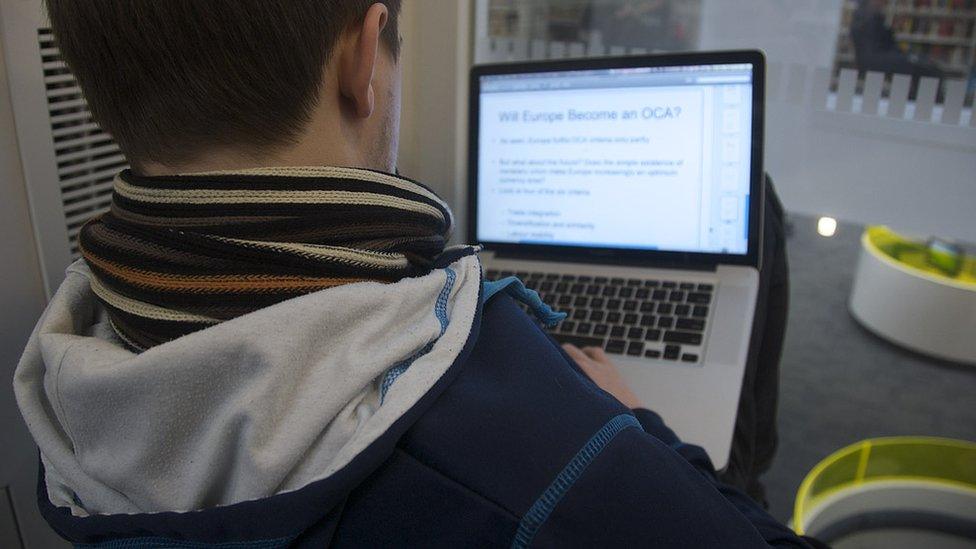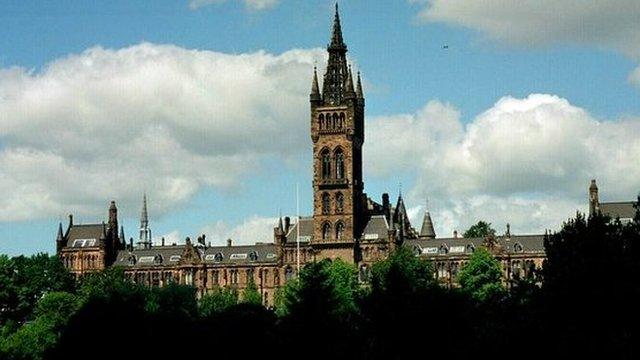Scottish universities reach Times 'top 200' list
- Published

Academic reputation and staff to student ratios are considered for the rankings
Five Scottish universities have climbed up a respected table of the world's top higher education institutions.
Scotland now has a total of five universities in the top 200 of the Times Higher Education world rankings and three in the top 100.
The University of Edinburgh is the top-ranked Scottish institution in 24th place.
Glasgow has moved to its highest ranking of 76th place and St Andrews is ranked 86th.
Aberdeen rose to 172nd place while Dundee re-entered the top 200 in 185th place.
The rankings were based on performance in a number of areas, including academic reputation, employer reputation, staff to student ratios, research citations and international students and faculty.
League tables like this one are ultimately subjective. Crucially they do not suggest a degree from one university is better than one from another.
'Hard work'
Scottish Education Secretary Angela Constance said: "To see five institutions back in the top 200 and all five substantially improving their placing again demonstrates that our Higher Education institutions are up there with the very best in the world.
"We really do punch above our weight and thanks are due to the hard working staff and students that have made this possible."
Edinburgh University said: "It is always pleasing to see the university perform strongly in international league tables, reinforcing our ranking as one of the leading global universities.
"Our strong position is a tribute to the hard work and commitment of the entire university community.
Prof Anton Muscatelli, principal and vice chancellor of the University of Glasgow said its improved rankings capped a "fantastic year".
"It comes just after we became the only UK University to have attained a five-star plus award in the QS World Rankings and as we celebrate our highest ever position in the National Student Survey, joint top in Scotland," he said.
Universities Scotland's Director, Alastair Sim, said the rankings demonstrated Scotland was delivering "record levels of world-leading, impactful research" producing "highly-skilled graduates".
"League table results always make for interesting reading, but the sector's 'excellence' is not just a label. What it means in practice is that universities are always pushing to deliver more and better in every aspect of what they do."
Strong performance
A total of 34 British universities make the top 200, suggesting Scottish universities are punching above their weight in the table.
A strong showing in tables like these can assist universities in their efforts to attract research funding and the best students.
Some Scottish universities earn a significant proportion of their income from the large fees paid by students from outside the European union and research funding.
The rise in Scottish university rankings came as Scottish students continued to receive free tuition. When tuition fees were abolished in Scotland some claimed Scottish institutions could lose out to rivals south of the border and warned of an academic brain drain.
But some within academia continue to express concern about the implications of the Scottish government's Higher Education Governance Bill.
This would see the elected chairpersons for university courts and guaranteed places for union representatives on them.
Some academics fear the government wants to gain greater control over universities or fear the changes could inadvertently lead to universities being reclassified by the Office for National Statisitics as part of the public sector with implications for their finances.
The government denies that this is its intention.
Ms Constance believes the proposed legislation will modernise Scotland's universities and "enhance their important contribution to Scottish society and the advancement of its people and economy".
Opponents are likely to use Scotland's strong showing in the table as an argument that change is not needed.
- Published4 October 2012
